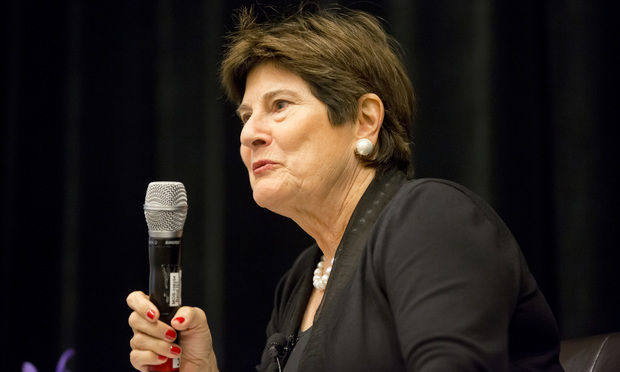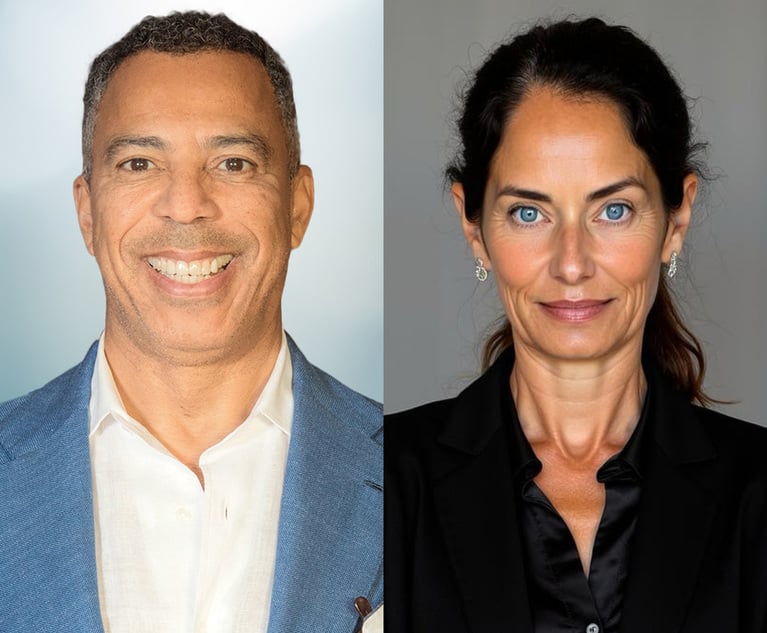Ninth Circuit: Shared IP Address Not Enough to Dole Liability in Copyright Infringement
The owner who shared a internet connection has no affirmative duty to police for copyright violations, the panel decided.
August 27, 2018 at 06:45 PM
3 minute read
 Judge Margaret McKeown of the U.S. Court of Appeal for the Ninth Circuit. Jason Doiy/ALM.
Judge Margaret McKeown of the U.S. Court of Appeal for the Ninth Circuit. Jason Doiy/ALM.
The owner of a shared internet connection isn't obliged to ensure others aren't committing copyright infringement on it, the U.S. Court of Appeals for the Ninth Circuit ruled Monday.
The court ruled that the owner of an adult foster home could not be held liable because someone downloaded pirated copies of the movie “The Cobbler” there.
Cobbler Nevada obtained the IP address of the infringing computer and traced it to Thomas Gonzales, the operator of the home. The company then charged Gonzales with infringement, either directly for downloading the copies personally or contributorily for failing to prevent either workers or residents from downloading, despite being sent more than 400 notices of infringing activity. Cobbler Nevada never determined who downloaded the movie.
Ninth Circuit Judge M. Margaret McKeown ruled Monday that wasn't enough to plead a plausible claim of copyright infringement under the familiar Twombly/Iqbal standards.
“The registered subscriber of an infringing IP address, standing alone, does not create a reasonable inference that he is also the infringer,” McKeown wrote in Cobbler Nevada v. Gonzales. As for contributory infringement, without allegations of intentional encouragement or inducement of infringement, “an individual's failure to take affirmative steps to police his internet connection is insufficient to state a claim.”
McKeown pointed frequently to the Supreme Court's peer-to-peer sharing decision in MGM v. Grokster, which pins liability on individuals who “encourage or assist” the infringement.
Cobbler Nevada didn't identify such conduct, McKeown wrote. Instead it sought to impose an active duty to monitor one's internet service for infringement.
“Imposing such a duty would put at risk any purchaser of internet service who shares access with a family member or roommate, or who is not technologically savvy enough to secure the connection to block access by a frugal neighbor,” McKeown wrote.
She affirmed U.S. District Judge Michael Simon's decision to award $17,222 in attorney fees to Gonzales. She agreed with Simon that the fee award would discourage Cobbler Nevada from an “overaggressive pursuit of alleged infringers without a reasonable factual basis” while encouraging defendants with valid defenses to defend their rights.
Judges Richard Paez and Robert Lasnik, the latter visiting from Oregon district court, concurred.
David Madden of Mersenne Law in Tigard, Oregon, had the winning argument for Gonzales. Cobbler Nevada's appellate counsel, John Mansfield of Portland's Harris Bricken, argued that the fees should not have been awarded because his client voluntarily dismissed its claims.
Lasnik, the visiting judge, told Madden at the May argument that he's aware of a coffee shop that uses “No Illegal Downloads” as its password. “That gives you a defense right there,” he said.
This content has been archived. It is available through our partners, LexisNexis® and Bloomberg Law.
To view this content, please continue to their sites.
Not a Lexis Subscriber?
Subscribe Now
Not a Bloomberg Law Subscriber?
Subscribe Now
NOT FOR REPRINT
© 2025 ALM Global, LLC, All Rights Reserved. Request academic re-use from www.copyright.com. All other uses, submit a request to [email protected]. For more information visit Asset & Logo Licensing.
You Might Like
View All
Growth of California Firms Exceeded Expectations, Survey of Managing Partners Says
5 minute read
Google Makes Appeal to Overturn Jury Verdict Branding the Play Store as an Illegal Monopoly
5 minute read
Eight Years On, A&O Shearman’s Fuse Legal Tech Incubator Is Still Evolving
4 minute read
Chicago Law Requiring Women, Minority Ownership Stake in Casinos Is Unconstitutional, New Suit Claims
5 minute readTrending Stories
- 1Thursday Newspaper
- 2Public Notices/Calendars
- 3Judicial Ethics Opinion 24-117
- 4Rejuvenation of a Sharp Employer Non-Compete Tool: Delaware Supreme Court Reinvigorates the Employee Choice Doctrine
- 5Mastering Litigation in New York’s Commercial Division Part V, Leave It to the Experts: Expert Discovery in the New York Commercial Division
Who Got The Work
J. Brugh Lower of Gibbons has entered an appearance for industrial equipment supplier Devco Corporation in a pending trademark infringement lawsuit. The suit, accusing the defendant of selling knock-off Graco products, was filed Dec. 18 in New Jersey District Court by Rivkin Radler on behalf of Graco Inc. and Graco Minnesota. The case, assigned to U.S. District Judge Zahid N. Quraishi, is 3:24-cv-11294, Graco Inc. et al v. Devco Corporation.
Who Got The Work
Rebecca Maller-Stein and Kent A. Yalowitz of Arnold & Porter Kaye Scholer have entered their appearances for Hanaco Venture Capital and its executives, Lior Prosor and David Frankel, in a pending securities lawsuit. The action, filed on Dec. 24 in New York Southern District Court by Zell, Aron & Co. on behalf of Goldeneye Advisors, accuses the defendants of negligently and fraudulently managing the plaintiff's $1 million investment. The case, assigned to U.S. District Judge Vernon S. Broderick, is 1:24-cv-09918, Goldeneye Advisors, LLC v. Hanaco Venture Capital, Ltd. et al.
Who Got The Work
Attorneys from A&O Shearman has stepped in as defense counsel for Toronto-Dominion Bank and other defendants in a pending securities class action. The suit, filed Dec. 11 in New York Southern District Court by Bleichmar Fonti & Auld, accuses the defendants of concealing the bank's 'pervasive' deficiencies in regards to its compliance with the Bank Secrecy Act and the quality of its anti-money laundering controls. The case, assigned to U.S. District Judge Arun Subramanian, is 1:24-cv-09445, Gonzalez v. The Toronto-Dominion Bank et al.
Who Got The Work
Crown Castle International, a Pennsylvania company providing shared communications infrastructure, has turned to Luke D. Wolf of Gordon Rees Scully Mansukhani to fend off a pending breach-of-contract lawsuit. The court action, filed Nov. 25 in Michigan Eastern District Court by Hooper Hathaway PC on behalf of The Town Residences LLC, accuses Crown Castle of failing to transfer approximately $30,000 in utility payments from T-Mobile in breach of a roof-top lease and assignment agreement. The case, assigned to U.S. District Judge Susan K. Declercq, is 2:24-cv-13131, The Town Residences LLC v. T-Mobile US, Inc. et al.
Who Got The Work
Wilfred P. Coronato and Daniel M. Schwartz of McCarter & English have stepped in as defense counsel to Electrolux Home Products Inc. in a pending product liability lawsuit. The court action, filed Nov. 26 in New York Eastern District Court by Poulos Lopiccolo PC and Nagel Rice LLP on behalf of David Stern, alleges that the defendant's refrigerators’ drawers and shelving repeatedly break and fall apart within months after purchase. The case, assigned to U.S. District Judge Joan M. Azrack, is 2:24-cv-08204, Stern v. Electrolux Home Products, Inc.
Featured Firms
Law Offices of Gary Martin Hays & Associates, P.C.
(470) 294-1674
Law Offices of Mark E. Salomone
(857) 444-6468
Smith & Hassler
(713) 739-1250






